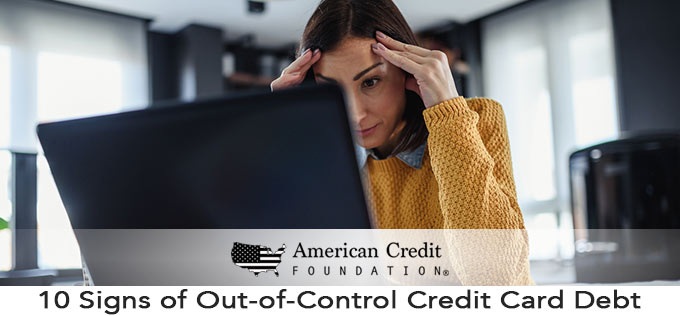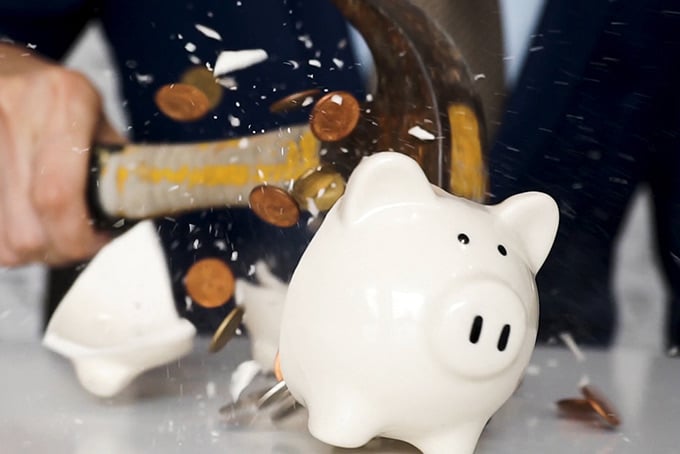10 Signs of Out-of-Control Credit Card Debt

10 Signs of out-of-control credit card debt. Chances are, your reasons for getting a credit card were solid. Maybe you wanted to improve your credit score. Possibly you were looking for a financial safety net until you were able to build your emergency fund. But somewhere along the way, you began using the credit card for more and more purchases until it was maxed out – or worse.
If you’re trying to get a grip on your financial situation, here are 10 signs you should look for to determine whether your credit card debt has spun out of control.
1. The Sky Shouldn’t Be the Limit
It’s easy to dig yourself into a financial hole by maxing out your credit cards. And when you find that one or more of your cards is maxed out, it’s a definite sign that your debt is out of control. Paying off the credit card balance each month is a great way to build credit. But if your cards are maxed out, it can cause multiple problems.
Maxed-out credit cards reduce your safety net in case an emergency arises. If you exceed your limit, your lender could raise your interest rates. A high utilization rate (the amount you owe divided by your total amount of credit on all cards) also negatively affects your credit score.
2. It’s Become a Bad Habit
While it’s true that some people pay for everything with their card to get cash back or other card rewards, it’s only beneficial if the balance is paid off every month. Imagine that you used your credit card to spend $200 per month for a year on groceries totaling $2,400, but you only made the $74 minimum payment each month. It would take you five years to pay off those groceries, and in the end, you would end up paying $1,641.29 in interest – 40.6% of what you paid would be interest!
3. You’re Beginning to Miss Things
When you start missing credit card payments or sending them in late, it’s a sign that you’re credit card debt is out of control. And this mistake could be costly: Every time you pay late, the issuer adds a late fee to your balance, making it even more difficult to get caught up. And that late fee will also typically trigger your interest rate to go even higher. Credit card companies may legally charge up to $29 for late payments, and if you miss your payment deadline more than once, the fee can go as high as $40.
4. Secrecy is a Red Flag
Are you hiding your credit card bills from your spouse? Do you avoid talking about your debt to your friends or other family members? If so, it could be a clear sign that your credit card debt has become an issue. Remember, it’s a sign that something is wrong if you feel the need to hide it from the people in your life.
5. You’re Robbing Peter to Pay Paul
Do you borrow from another source to make your card’s monthly payments? If you need to take out a payday loan or cash advance to make your credit card payment, it’s a sure sign that your debt has spiraled out of control. And the extra fees that the second lender charges will put you in even more debt.
6. Your Emergency Fund Takes a Backseat

We all understand that a healthy emergency fund is fundamental to a robust financial life. But if you’re spending all of your money to pay your credit card bills, it may become impossible to continue to build your fund. When that happens, it’s time to admit that your credit card debt is out of control.
7. Your Health Takes a Hit
If you’re stressed out about your credit card debt, it’s another sign that it’s time to rein it in. One study of university students showed that when credit card debt exceeded $1,000, the participants were at risk for obesity/overweight or unhealthy weight control, body dissatisfaction, poor diet habits, substance abuse, binge drinking, and violence.
8. Your Credit Score Slips Away
Many people maintain credit cards to help build their credit, but if your card balance is too high, it can do just the opposite. Your credit score is made up of many factors, and a significant one is the amount of your total available credit that you use. If it’s more than 30%, your credit score will decrease.
Imagine that you have $10,000 in available credit. If your credit card balances exceed $3,000 (30% of $10,000), your score will go down. Using more than 30% of your available credit is another sign that your credit card debt is spinning out of control.
9. You’re Learning to Take “No” for an Answer
Have other creditors begun declining your applications? Card issuers use credit risk-predictive software when analyzing applications, and that software can foretell if you’re in credit card debt over your head.
One sure way to know if this is the reason you were denied credit is to wait for the declination letter that will arrive from the issuer within 30 to 90 days. Look for the denial reason, and if it’s because your card balances are too high, that’s a good indication that your debt is out of control.
10. Legal Troubles Begin
Finally, the most obvious way to know if your credit card debt is out of control is if you are sued by the card issuer. Credit card companies can file a lawsuit against delinquent cardholders, and if they win a judgment, they can garnish that person’s wages.
If reading this list makes you realize that you need to rein in your credit card spending, we can help. At American Credit Foundation, our counseling team is ready to work with you on devising a plan that will get you back on your financial feet. Give us a call today, and begin the journey toward financial health.

